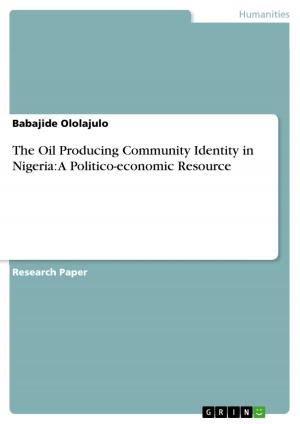| Author: | Evamaria Nittnaus | ISBN: | 9783656023142 |
| Publisher: | GRIN Verlag | Publication: | October 7, 2011 |
| Imprint: | GRIN Verlag | Language: | English |
| Author: | Evamaria Nittnaus |
| ISBN: | 9783656023142 |
| Publisher: | GRIN Verlag |
| Publication: | October 7, 2011 |
| Imprint: | GRIN Verlag |
| Language: | English |
Master's Thesis from the year 2006 in the subject Ethnology / Cultural Anthropology, grade: 5.0 (out of 6), University of Basel (Ethnologisches Institut), language: English, abstract: In this thesis, written to reach the Swiss equivalent of a MA degree, I will attempt to highlight three main topics, which I propose show some interesting developments and possibilities for today's anthropologists: 1) that anthropology offers a methodology well-suited to look at the way people behave online; 2) that the digital divide has to be seen as complex reality with more than one dimension; and 3) that, despite all the (mostly justified) criticism and pessimism, the Internet offers many possibilities for those on the margins of a globalized society. For the latter I have chosen the Internet experience of Native Americans, who are in an especially interesting situation because they live in one of the best- connected countries in the world, yet face a number of challenges when it comes to accessing and using the Internet. These three dimensions will be described and analyzed in this thesis, using available research literature, Internet sources and a questionnaire I posted on a website created specifically for my thesis project, because it felt important to me to get some first-hand information as well, at least in a limited way.
Master's Thesis from the year 2006 in the subject Ethnology / Cultural Anthropology, grade: 5.0 (out of 6), University of Basel (Ethnologisches Institut), language: English, abstract: In this thesis, written to reach the Swiss equivalent of a MA degree, I will attempt to highlight three main topics, which I propose show some interesting developments and possibilities for today's anthropologists: 1) that anthropology offers a methodology well-suited to look at the way people behave online; 2) that the digital divide has to be seen as complex reality with more than one dimension; and 3) that, despite all the (mostly justified) criticism and pessimism, the Internet offers many possibilities for those on the margins of a globalized society. For the latter I have chosen the Internet experience of Native Americans, who are in an especially interesting situation because they live in one of the best- connected countries in the world, yet face a number of challenges when it comes to accessing and using the Internet. These three dimensions will be described and analyzed in this thesis, using available research literature, Internet sources and a questionnaire I posted on a website created specifically for my thesis project, because it felt important to me to get some first-hand information as well, at least in a limited way.















